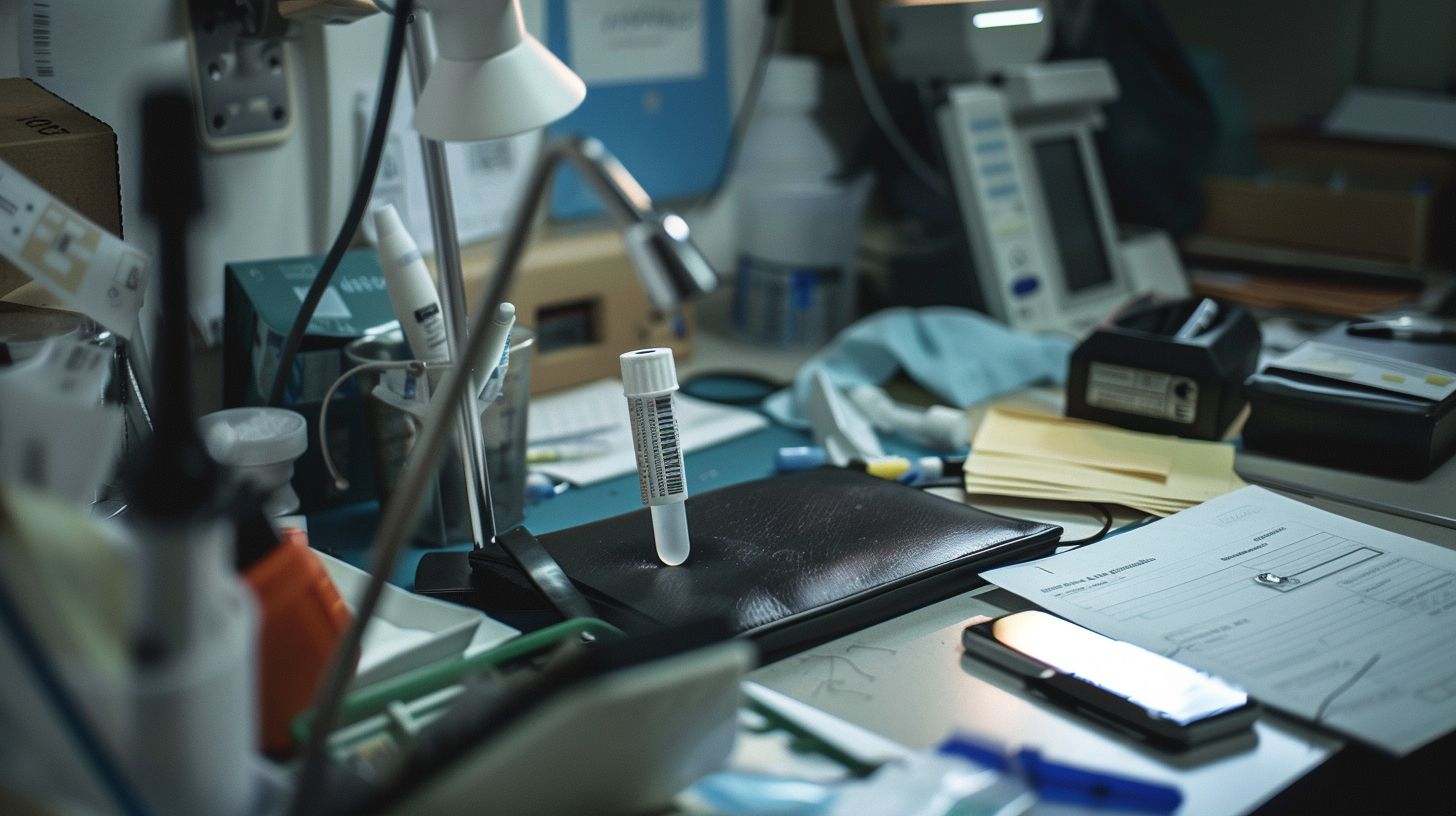


Finding out if someone has Alzheimer’s disease is hard. A new study shows a blood test that is 90% accurate. This article will explain how the test works and why it’s good for doctors’ offices.
Keep reading to learn more.
Key Takeaways
- A new blood test can find Alzheimer’s with 90% accuracy using proteins in the blood, making it easier for doctors to detect the disease early.
- This test looks for specific markers, like p-tau217 and amyloid levels, which are high in people with Alzheimer’s compared to those without.
- Doctors tested this method on over 1,200 people showing signs of memory problems. They used a technique called mass spectrometry.
- The APS2 blood test is better than old ways of finding Alzheimer’s because it is quick, simple, and doesn’t hurt patients. It also costs less money.
- Early spotting of Alzheimer’s through this test allows doctors to start treatment sooner, which can help slow down the disease.
Overview of the Alzheimer’s Blood Test Study

The study showed the blood test for Alzheimer’s is spot on. They used science steps and checked their results well.
Key findings
Scientists found a blood test that is 90% right in telling if someone has Alzheimer’s. Before, doctors had to guess based on signs or use big machines like PET scans which were not as good.
Now, they have a way to see the disease early by finding certain proteins in the blood. These proteins show up when the brain starts to get sick. The study showed this new test could find these signs of Alzheimer’s really well.
Doctors checked this test in regular offices and saw it could tell if someone had Alzheimer’s almost as well as very expensive brain scans used before. This means soon, many more people can know if they have Alzheimer’s without needing those big machines or waiting a long time for answers.
Methodology used
Researchers Dr. Chinta Sidharthan, Stephen Salloway, Christopher Rowe, and Jeffrey M. Burns studied 1,213 individuals with an average age of 74. These people had signs of cognitive decline or dementia.
The team took plasma samples from each person. Then they used a technique called mass spectrometry to look closely at these samples.
They were checking for two things: p-tau217 and beta-amyloid 40/42 levels in the blood. Mixing these two measures gave them a score that helped diagnose Alzheimer’s disease accurately.
This method shows how doctors can find Alzheimer’s with just a blood test.
Next, let’s see how this blood test works in more detail.
How the Alzheimer’s Blood Test Works

The Alzheimer’s blood test finds specific proteins, like p-tau217, which hint at the disease. Doctors use a simple blood draw to check for these signs, making the process easy and fast.
Explanation of p-tau217 markers
p-tau217 markers act like red flags for amyloid pathology in the brain, a key sign of Alzheimer’s disease. Amyloid plaques must be present for p-tau217 levels to rise. In people with Alzheimer’s, these levels are over 8 times higher compared to those without the condition.
This marker does not increase due to other types of dementia that don’t involve amyloid, such as frontotemporal dementia (FTD). Thus, testing for p-tau217 provides a clear indication whether someone has Alzheimer’s or another form of cognitive decline.
With this understanding, let’s explore how blood tests can detect these crucial markers…
Process of blood testing
The Alzheimer’s blood test detects key markers in the blood. Doctors can use this test to find signs of the disease early on. Here’s how it works:
- A health care professional draws a small sample of blood from the patient’s arm.
- The sample goes to a lab where technicians use mass spectrometry, a powerful tool, to look closely at the blood.
- They search for p-tau217 and beta-amyloid 40/42 levels in the plasma, both important clues for Alzheimer’s disease.
- By measuring these markers, they also create a ratio of amyloid 42/40 to see if the balance is off.
- Combining these measures gives doctors a final score that tells them if Alzheimer’s signs are present.
This process makes finding Alzheimer’s easier and more accurate than many older methods. It can help primary care doctors catch the disease early, which is crucial for planning treatment.
Accuracy and Reliability of the Test

This new Alzheimer’s blood test shows promise, beating old ways of finding the disease. It works well, using signs in the blood to tell if someone has Alzheimer’s or not.
Comparison with existing diagnostic methods
The APS2 blood test represents a significant improvement in accuracy for Alzheimer’s diagnosis, with a precision of 91%. This is a notable improvement over traditional methods. The following comparison outlines the advancements.
| Diagnostic Method | Accuracy | Availability | Cost | Invasiveness |
|---|---|---|---|---|
| APS2 Blood Test | 91% | Widely available in physician offices | More affordable | Non-invasive |
| Neurologist Assessment | 73% | Appointment with a specialist needed | Cost varies, often higher | Non-invasive |
| Primary Care Doctor Assessment | 61% | Commonly available | Cost varies, often more affordable | Non-invasive |
| Spinal Tap | Generally high accuracy | Less common | Costly | Invasive |
| Amyloid PET Scan | Generally high accuracy | Less available in the U.S. | Cost is very high | Non-invasive but involves exposure to radioactive tracers |
The APS2 blood test excels beyond conventional diagnostic methods in precision, ease of use, affordability, and patient comfort. Its high accuracy and non-invasive nature mark it as a pivotal development for early identification and management in medical offices. In contrast to spinal taps and amyloid PET scans, it does not necessitate costly equipment or subject patients to invasive procedures. Thus, the APS2 blood test is an invaluable tool in addressing Alzheimer’s disease, providing the possibility of more effective control through early discovery.
Statistical significance of the results
The p-tau217 blood test shows remarkable data. It correctly picks up on beta-amyloid levels with 96% accuracy and tau protein with 97% precision. These numbers are crucial for doctors trying to spot Alzheimer’s early on.
Compared to current methods used by neurologists and primary care physicians, which stand at 73% and 61% diagnostic accuracy respectively, this advancement is significant.
Doctors look for clues of mild cognitive impairment in patients showing cognitive symptoms. This new tool could change how they work, making it easier to find the disease fast. With a solid 90% success rate in pinpointing Alzheimer’s disease, the potential for better care is huge.
Challenges remain, though, as we move forward into broader use within healthcare settings.
Implications for Physician Offices

Doctor’s offices could use this test to find Alzheimer’s early. It helps them treat patients sooner, making a big difference in care.
Potential for routine screening
Doctors could soon use blood tests as a regular check for Alzheimer’s, much like how cholesterol tests are now. This big step means people might get checked often, catching signs of Alzheimer’s early.
If the test shows Alzheimer’s markers, doctors will confirm with brain scans or spinal fluid tests. But if the test doesn’t find anything, that’s good news and means no further checks needed right away.
This easy test in doctor’s offices can spot problems early, helping start treatments sooner and improving lives.
Benefits for early detection and treatment
Routine screening opens the door to catching Alzheimer’s early. Finding this disease soon means people can change how they live and get treatments to slow it down. This quick action cuts wait times for diagnosis from a year or more to just six months.
Early detection also means doctors can separate Alzheimer’s from other brain problems like frontal lobe dementia, using signs like high tau levels in the blood. Knowing exactly what’s wrong allows for the right treatment plan.
Plus, with amyloid deposits taking years to show symptoms, spotting them early gives everyone a head start in fighting back.
Challenges and Limitations
The Alzheimer’s blood test shows promise but faces hurdles. Test results can vary and the cost might limit who can get it.
Variability in test results
Blood tests for Alzheimer’s show different results across various racial and ethnic groups. This fact means some people might get a test result that does not match their true health condition.
Since the study sample lacked diversity, it’s hard to say if these findings apply to everyone. Doctors and scientists know this issue needs fixing before all physician offices can use the blood test.
Also, because of differences in health conditions like vascular dementia and neurodegenerative diseases, test outcomes can vary. People with other medical conditions might have misleading results.
Knowing this helps healthcare professionals be more accurate when they use the Alzheimer’s blood test in clinical practice. It ensures patients receive the right diagnosis and treatment plan based on their unique situation.
Accessibility and cost concerns
Making the new Alzheimer’s blood test easy to get and affordable is tough. Right now, spinal fluid tests and amyloid PET scans are what doctors use a lot. These tests cost a lot of money and can be hard on patients.
The blood test needs FDA approval in the U.S. before most people can use it. This means it has to pass lots of checks to make sure it’s safe and works right.
Doctors’ offices could use this test easily if it becomes available widely. It could help find Alzheimer’s early without needing costly or painful procedures like lumbar punctures or PET imaging used for diagnosing brain conditions today.
Early finding can lead to better care for people with the disease. But first, we need to deal with how much the test costs so everyone who needs it can afford it.
Conclusion
This new blood test changes the game for Alzheimer’s detection. With a 90% accuracy rate, it stands out against spinal fluid tests and amyloid PET scans. Now, doctors in offices can spot Alzheimer’s early.
Early detection means better treatment options. This breakthrough could lead to routine screening, making a big difference for millions.
FAQs
1. What’s the news about Alzheimer’s blood test accuracy?
The latest study confirms that a revolutionary Alzheimer’s blood test, which detects amyloid-beta plaques and tau tangles, has proven accurate in physician offices.
2. Who conducted this research on the Alzheimer’s blood test?
The research was conducted by Lund University and published in JAMA Neurology.
3. How does this new Alzheimer’s blood test work?
This cutting-edge test identifies biomarkers such as amyloid beta and tau proteins, linked to Alzheimer’s dementia. Detecting these early can help diagnose mild cognitive impairments before they progress.
4. Is it better than other diagnostic methods like PET scans or CT scans?
While positron emission tomography (PET) scans and computed tomography (CT) scans are valuable tools for diagnosing neurological diseases such as Alzheimer’s, this innovative blood test simplifies the diagnostic work-up process significantly.
5. Can misdiagnoses happen with this new method?
As with any medical tests, there is a cutoff value beyond which results might indicate disease presence; however, health care professionals must consider comorbidities like depression or sleep apnea that could mimic cognitive deficits associated with Alzheimers’. So yes, misdiagnoses are possible but less likely due to its high accuracy rate.
6. Will I be able to access information about clinical trials of drugs like lecanemab or donanemab via my email inbox?
Yes! The Alzheimer’s Association often provides updates on clinical trials involving drugs like lecanemab or donanemab through e-mail notifications for those interested.





